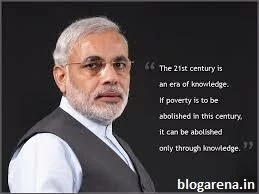 Narendra Damodardas Modi is one of the finest politicians in India. Presently, he is the chief minister of Gujarat. He is the chief representative of the Bharatiya Janta Party (BJP). He is an indispensable part of the party. These days he is in limelight as he is a competing contender in the forthcoming 2014 Indian general elections for the Prime minister’s post. Thus, most of the people are interested in knowing more about Narendra Modi i.e. about his birth, upbringing, lifestyle, political achievements and much more.
Narendra Damodardas Modi is one of the finest politicians in India. Presently, he is the chief minister of Gujarat. He is the chief representative of the Bharatiya Janta Party (BJP). He is an indispensable part of the party. These days he is in limelight as he is a competing contender in the forthcoming 2014 Indian general elections for the Prime minister’s post. Thus, most of the people are interested in knowing more about Narendra Modi i.e. about his birth, upbringing, lifestyle, political achievements and much more.
In October 2001, Modi became the chief minister of the state of Gujarat upon the resignation of Keshubhai Patel. In the history of Gujarat, he became the longest-serving chief minister in power in July 2007. He served for 2063 days constantly and presently he is in his fourth consecutive year of working as a chief minister. He is among one of the few popular faces in India as well as worldwide. He had received appreciation for the economic development that took place in Gujarat under his administration. However, he is also widely criticized for his disability to make a positive impact on the human resource development of the state of Gujarat. He is a member of the Rashtriya Swayamsevak Sangh (RSS) and is defined as a Hindu Autonomist by the scholars, media and himself.
Modi also received many awards and recognitions for his work and administration. He received Gujarat Ratna award and e-Ratna award. He also received the Best Chief Minister by India Today magazine as per their survey of 2006. He was also felicitated with the fDi personality of the year for 2009 by the fDi magazine. In 2012, Modi even managed to appear on the cover page of the Asian edition of Times, very few politicians were able to do so. He is generally described as a notorious, determined and a smart politician. He is also referred to as a great leader who can push India out of the sludge of continuing corruption and inadequacy.
Narendra Modi was born in a grocer’s family on 17 September 1950 in Vadnagar, Mehsana district. His father’s name was Domodardas Mulchand Modi and his mother’s name was Heeraben. He was the third child among the six children who were born to them. In his teen days, he ran a tea stall with his elder brother around a bus workstation. He took his education in a local school of Vadnagar. In his schooling days, he was an average grade student but a dedicated debater. In the mid sixties during Indo-Pak war, he was a young boy and then also he took initiative to serve the soldiers in journey at stations. He also took initiative to help the flood affected people of Gujarat in 1967. During any massacre or calamity, he takes the charge of the situation himself and helps those people in every possible way he can. He don’t bother that he is the chief minister of the state and works like a common man.
During the India-Pak war in the mid sixties, even as a young boy, he volunteered to serve the soldiers in journey at railway stations. In 1967, he served the flood affected people of Gujarat.
After this, he started working in the canteen staff of the Gujarat State Road Transport Corporation, were he stayed until the time he became a full-fledged propagandist of the Rashtriya Swayamsevak Sangh. After receiving his training in Nagpur Modi began taking an active part in the party work and was appointed to look after the students section, Akhil Bhartiya Vidyarthi Parishad (ABVP) in Gujarat. While working in the RSS he even finished his master’s degree from the Gujarat University in political science.
In 1987, Modi was seconded by the RSS to BJP. Modi became a prominent figure after he arranged the Ekta Yatra of Murli Manohar Joshi. In the 1995 state elections, his electoral policy played a vital role in the victory of BJP. He first became the General Secretary of BJP and then was promoted to the position of National Secretary of BJP. In the elections of 1998, his policies played a major role in the victory of BJP of those elections.
Modi first became the chief minister of the Gujarat state in 2001. Keshubhai Patel’s ill health, allegations of exploitation of influence, corruption, poor management and loss of seats of BJP in the elections, provoked the national leader of BJP to look for another contender for the position of chief minister of Gujarat. The 2001 Bhuj Earthquake also added to the deteriorating position of Patel’s governance. This is where Narendra Modi came into the scene. The senior leader of BJP, L.K. Advani was not in favor of excluding Patel from the party and even doubted Modi’s capability of managing the party. Thus it was recommended to appoint Modi as the deputy chief minister in the government under Patel. However, Modi refused to this offer and informed that either he want to be wholly answerable for the working of the party or not at all. It was on 7 October 2001 when Modi was selected as the chief minister of the state of Gujarat and was handed over the responsibility of arranging the entire BJP for the December 2002 elections. Modi’s basic view of administration revolved around small government and privatization.
Modi played a prominent role in the Gujarat violence of 2002. On 27 February 2002, a train carrying few hundred travelers including a heavy number of Hindu devotees was burnt near Godhra because of which 58 people died. Rumors emerged that the Muslim crowd was responsible for the burning of the train and this lead to the emergence of Anti-Muslim Violence all over the state of Gujarat. Human Rights organizations, opposition party and the media criticized the government of Gujarat for not adopting significant measures to stop the violence. Many criticized Modi for the violence. Some people were of a view that it was none other than Modi who was responsible for this communal riot. However, this was not true. As the outcome of this violence, many wanted that Modi should resign from the post of chief minister of Gujarat. The opposition put allegations on Modi and because of the growing anger of people Modi resigned from the post of chief minister. In the consequent elections, the BJP formed by Modi managed to won 127 seats out of 182 member seats. Modi influenced people by giving speeches on intense anti-Muslim violence during the campaign.
He has worked throughout his life for the welfare of the people of Gujarat. Various yojanas and policies were implemented by him for the betterment of the poor and the common man of the state. These policies includes Beti Bachao campaign, Chiranjeevi Yojna, Soil health cards, Roaming school cards, Any time milk (ATM), Jyotigram Yojna, E-Mamata, Krishi Mahotsavand many more. He has taken the state of Gujarat to new heights. Various developed countries like Japan, England etc are keen on working with Modi. He is popular all over the world just because of his good governance. Today, every country and especially India need this man to change the system and make this country to stand head to head with other developed and strong countries.



